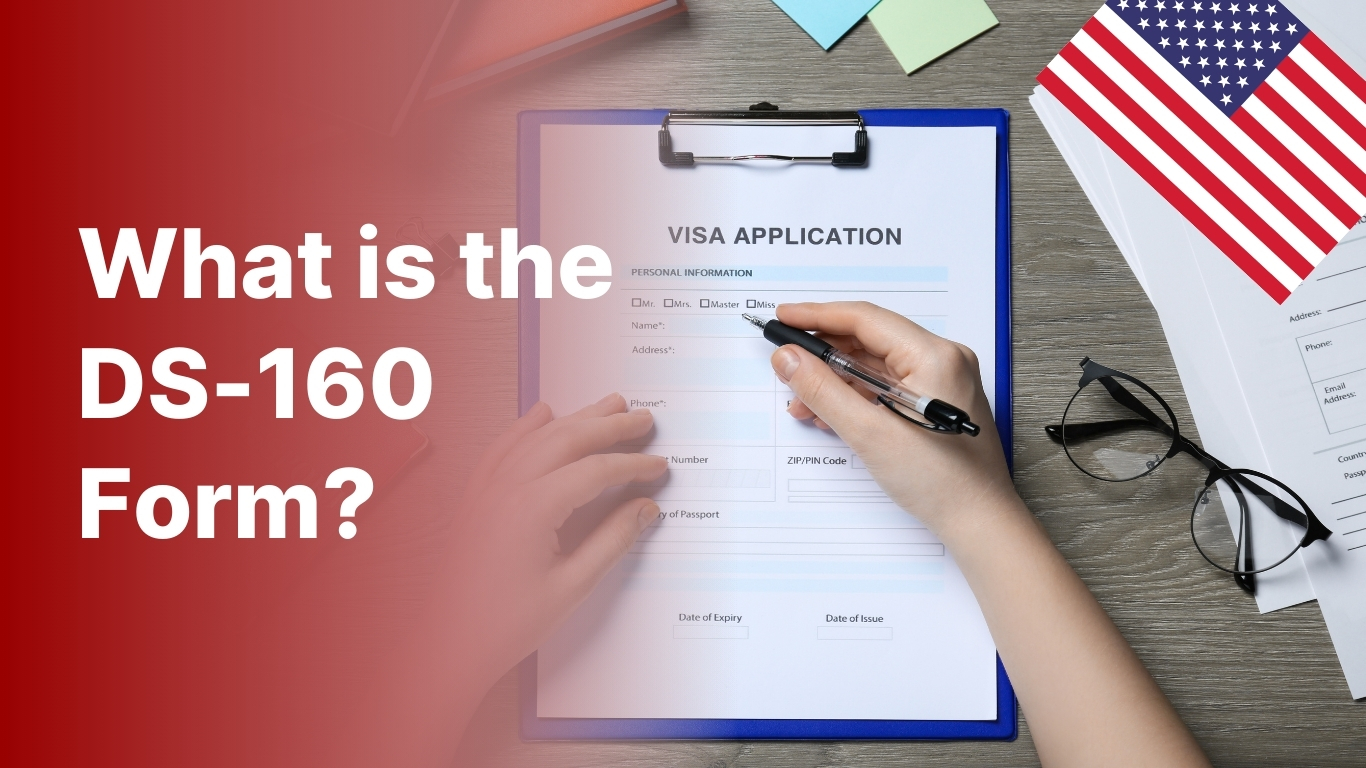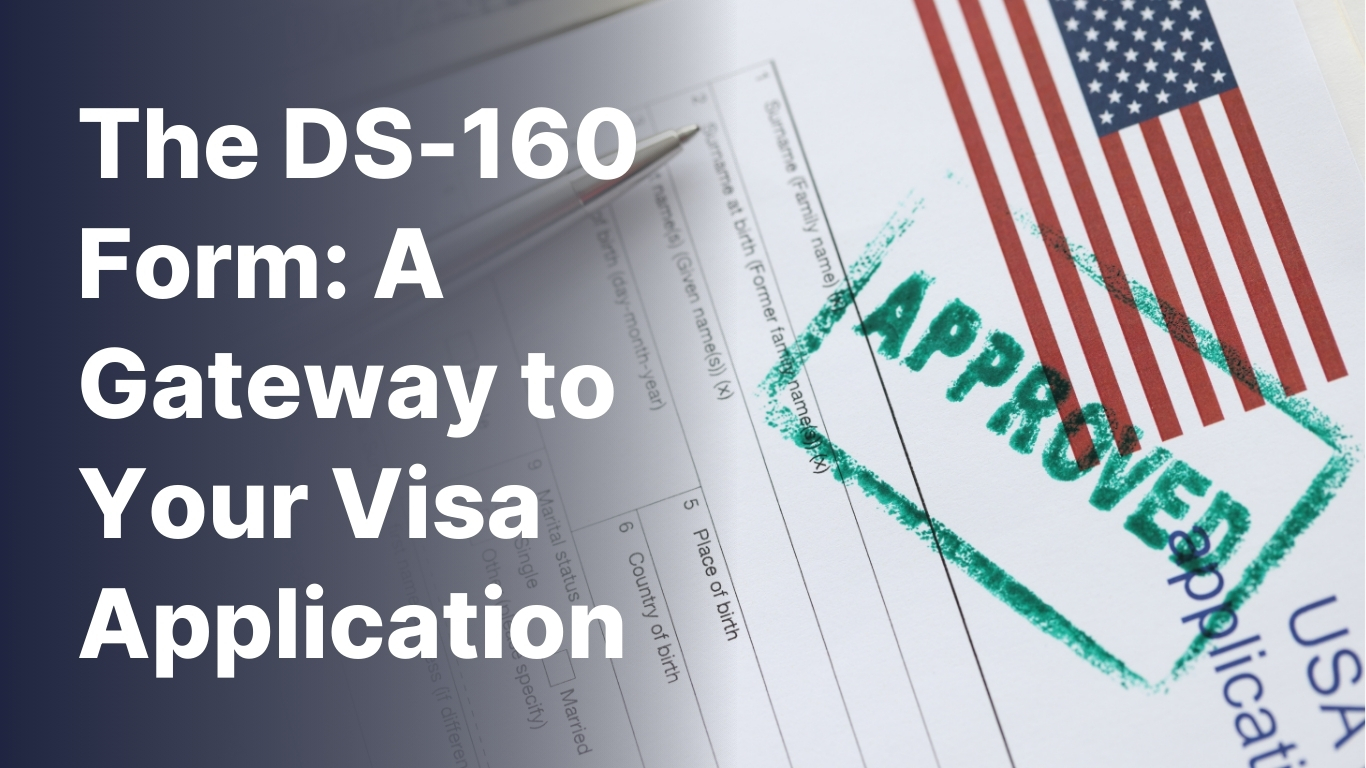Introductions
Navigating the U.S. Visa Application Process: The DS-160 Form
If you’re an international traveler planning to visit the United States for business, education, tourism, or any other purpose, you will almost certainly encounter the DS-160 form. This form is an essential part of the U.S. visa application process, acting as the cornerstone for most non-immigrant visa applications. Whether you're applying for a student visa (F or M visa), a tourist visa (B1/B2), or a work visa (H1-B), completing the DS-160 accurately is critical to your success.
Why the DS-160 Matters to You
The DS-160 form serves as a detailed record of your background, travel plans, and security information. The U.S. Department of State uses this form to assess whether you meet the qualifications for the visa you’re applying for. It includes crucial questions about your personal identity, your travel history, and even your social media presence. Think of it as the first step in making your dream of studying, working, or visiting the U.S. a reality. Get it wrong, and your visa could be delayed or denied.
The Weight of Accuracy: Real-World Statistics
The DS-160 is not just a formality. According to the U.S. State Department, over 8 million non-immigrant visa applications are processed annually. For instance, in 2022, nearly 2 million B1/B2 tourist visa applications were processed alone. A recent report found that 80% of visa denials stem from common mistakes made on the DS-160 form or discrepancies between the application and supporting documents. Inaccurate or incomplete answers could result in delays, a rejected application, or even a ban on applying again for several years.
In fact, some common mistakes such as failing to match the name on your passport with the one listed on the DS-160 or submitting a photo that doesn’t meet U.S. visa standards are frequent causes for rejection. Hence, understanding how to fill out the form correctly is of the utmost importance.
A Step-by-Step Roadmap for Success
This guide is designed to help you navigate the DS-160 form, step by step, to ensure that you don’t miss anything and avoid unnecessary setbacks. By the end of this article, you’ll know exactly how to:
- Accurately fill out every section of the form.
- Avoid the most common mistakes applicants make.
- Understand what consular officers are looking for in your responses.
- Successfully submit your DS-160 and increase your chances of obtaining your U.S. visa.
Why the DS-160 Form is So Important
The DS-160 form is your first introduction to the U.S. government’s immigration system. Consular officers use the details you provide to make their judgment about your eligibility for a visa. A mistake on this form can lead to a delay in your visa process, requiring you to fill out a new form, or worse, a denial of your visa altogether. Filling out the form correctly is the key to starting your U.S. journey on the right foot.
The Application Process: From DS-160 to Visa Interview
Once you’ve completed the DS-160 form, the next step is submitting it electronically through the U.S. Department of State's Consular Electronic Application Center (CEAC) website. Once submitted, you’ll receive a confirmation page with a barcode that you’ll need for your visa interview. This confirmation is vital as it verifies that you’ve completed the online application process.
You might think that filling out the DS-160 form is a simple task, but with hundreds of detailed questions and strict requirements, the process can be daunting. However, understanding the form, knowing the common mistakes, and following a clear, logical order when filling it out can make all the difference. This guide is here to provide you with that clarity.
Key Sections of the DS-160 Form
The DS-160 consists of several sections, each designed to gather specific information needed to process your visa application. Here’s a quick look at what you’ll need to provide:
- Personal Information: Basic information such as your full name, date of birth, passport details, and nationality.
- Travel Information: Details about your travel dates, where you will be staying, and your point of contact in the U.S.
- Previous U.S. Travel: Questions about any prior U.S. visits or overstays.
- Background and Security Questions: This section includes questions about your criminal background, immigration violations, and even your social media accounts.
- Photograph Upload: You’ll need to upload a passport-sized photo that meets specific requirements for U.S. visa applications.

What is the DS-160 Form?
The DS-160, also known as the Online Nonimmigrant Visa Application form, is a digital document that all individuals applying for non-immigrant visas to the United States must complete. It is used to collect personal, travel, and security information for visa applicants who wish to visit the U.S. for various reasons, such as studying, working, or traveling.
Who Needs to Fill Out the DS-160?
Whether you're applying for a tourist visa (B-1/B-2), student visa (F-1, M-1), work visa (H-1B), or any other non-immigrant visa, completing the DS-160 form is a mandatory part of the application process. The form is used by consular officers at U.S. embassies and consulates around the world to evaluate your eligibility for a visa.
The form asks for detailed information to ensure that the applicant meets the necessary legal and procedural requirements to be granted entry into the U.S.
Key Information Included in the DS-160 Form
- Personal Information: Full name, date of birth, nationality, and contact details.
- Passport Information: Passport number, issuance country, and expiration date.
- Travel Information: Intended travel dates, purpose of visit, and place of stay in the U.S.
- Previous U.S. Travel: Whether you’ve visited the U.S. before and the details of your previous visa or travel history.
- U.S. Contact Information: Name and contact details of the person you will be staying with or your sponsor in the U.S.
- Security and Background Information: Questions about your criminal background, previous visa denials, and other security-related queries.
- Photograph Requirements: A specific type of passport-sized photo needs to be uploaded with the form.
Filling out these sections accurately is essential, as any inconsistency may lead to delays or denials. Now let’s explore how to fill out the DS-160 form step-by-step.

Step-by-Step Guide to Completing the DS-160 Form
Completing the DS-160 form can feel like a complex process, but breaking it down into manageable steps can make it much easier. Below is a step-by-step guide to help you fill out the form correctly, ensuring that you meet all the necessary requirements and avoid common mistakes.
Step 1: Accessing the DS-160 Form
The first step in the DS-160 process is accessing the form. You can start the application by visiting the Consular Electronic Application Center (CEAC), which is the official platform for completing the DS-160 form. This is where you’ll fill out the application and submit it online.
- Tip: Always use an updated browser and a reliable internet connection to avoid issues during submission.
- Important Note: Make sure to save your work as you go along. The form is long and may time out after a period of inactivity.
Step 2: Selecting Your Visa Type
Before you start filling out the DS-160, you need to select your visa type based on the purpose of your travel. The DS-160 form is used for multiple types of nonimmigrant visas including tourist visas (B-1/B-2), student visas (F-1, M-1), and work visas (H-1B).
- Choose the correct visa category: This will dictate the information you will need to provide on the form.
- Important: If you’re applying for multiple visas (e.g., both a tourist and student visa), you will need to complete a separate DS-160 for each.
| Visa Type | Purpose | Example of Applicants |
|---|---|---|
| Tourist (B-1/B-2) | Travel or tourism | Tourists, short visits |
| Student (F-1/M-1) | Study or academic visit | Students planning to attend school |
| Work (H-1B) | Employment | Skilled workers coming to work in the U.S. |
Once the visa category is selected, click on “Start a New Application” to begin.
Step 3: Filling in Personal Information
This section requires personal details that must match your passport exactly. Here’s what you’ll need to provide:
- Full Name: Include your first, middle (if applicable), and last names. Make sure these match your passport.
- Other Names Used: If you have used any aliases or maiden names, you’ll need to include them here.
- Gender and Marital Status: Specify your gender and marital status.
- Date of Birth: Use the correct format: day, month, year.
- Nationality: The country you are a citizen of (this must match your passport).
- Passport Information: Provide your passport number, issue country, and expiration date.
Important Data: If there’s a typo in your name or passport information, your visa may be delayed or rejected.
- U.S. Department of State’s Official Statistics: According to the 2022 Visa Issuance Report from the U.S. Department of State, incorrect information in DS-160 applications is one of the top three reasons for delayed visa processing.
Step 4: Travel Information
Next, you’ll need to provide details about your trip:
- Travel Dates: Enter the planned date of arrival and the length of your stay.
- Purpose of Travel: This will match the visa type selected earlier (tourism, study, work, etc.).
- U.S. Contact Information: Enter the name and contact details of your sponsor, school, or place of stay in the U.S.
For students, you’ll need to specify:
- Institution Name: The name of the school or college you’ll be attending.
- Program Information: Your field of study and course details.
Tip: Double-check the dates of travel; if your intended arrival date changes, you may need to update your form.
Step 5: Upload Your Photo
Your photo must meet specific U.S. visa photo requirements. The photo should be recent, with a clear, white background and a neutral facial expression. Here are the guidelines:
- The photo must be in JPEG format.
- The resolution should be 600 x 600 pixels.
- File size should be less than 240 KB.
For a detailed guide on photo requirements, refer to the official U.S. Department of State photo guidelines.
Step 6: Answering Security and Background Questions
This section consists of several questions related to your background and criminal history. It includes questions such as:
- Have you ever been arrested or convicted?
- Do you have a contagious disease?
- Have you ever overstayed a visa in the U.S.?
Important Tip: Answer these questions truthfully. Any discrepancies between your answers and the consular officer's findings could lead to your visa being denied or revoked.
Data Insight: According to a report by the U.S. Visa Statistics 2022, about 4% of visa applications are denied due to security or criminal background issues, making it essential to be transparent in your answers.
Step 7: Review and Edit Your Information
Before submitting the form, carefully review all the information you’ve entered:
- Check for typos and errors: Even small mistakes can delay the process.
- Ensure consistency: Ensure all information matches your supporting documents, including your passport, travel plans, and financial records.
- Edit if needed: You can go back and edit any section if necessary.
Tip: If you're unsure about an answer, look it up or ask for clarification. It’s better to take extra time than submit incorrect information.
Step 8: Submit the DS-160 Form and Save the Confirmation Page
Once you have thoroughly reviewed your form, you can submit it. Upon submission, you will receive a confirmation page with a barcode. This is a crucial part of the visa application process.
- Print the confirmation page: You must bring this page to your visa interview. It contains a barcode and is used to verify your application.
Step 9: Scheduling Your Visa Interview
Once your DS-160 is submitted, you’ll be required to schedule a visa interview at your nearest U.S. embassy or consulate.
- Visa Appointment Wait Times: The average wait time for visa interviews can vary by country. For example, the U.S. visa appointment wait time in India was around 600 days in 2023 due to high demand.
- Scheduling Link: You can schedule your interview through the U.S. Visa Appointment Service.
Completing the DS-160 form is a crucial step in the U.S. visa application process. By following the step-by-step guide outlined here and ensuring all information is accurate and complete, you’ll increase your chances of a smooth visa application experience. Be patient, as the process can take time, but with the right approach, you’ll be prepared for a successful interview and visa approval.
Quick Links:
This step-by-step guide ensures that every section of the DS-160 form is explained thoroughly. If you need more details or have specific questions, feel free to ask!

Common Challenges and How to Overcome Them
Filling out the DS-160 form may sound straightforward, but many applicants encounter challenges along the way. Some of the most common challenges include:
1. Incorrect or Missing Information
Problem: This is one of the most frequent mistakes. Incomplete forms or incorrect personal details can delay your application process.
Solution: Double-check all details before submitting. For example, ensure your passport number, travel dates, and contact information are accurate. Refer to your official documents to confirm these details.
2. Misleading or Inaccurate Responses to Security Questions
Problem: Providing incorrect answers to the security and background questions can lead to serious consequences, including a visa refusal.
Solution: Always answer truthfully and provide as much detail as possible. If you have prior travel history or criminal convictions, disclose them and provide explanations if necessary.
3. Photo Problems
Problem: Not submitting the correct type of photo can cause delays in the visa application process.
Solution: Follow the U.S. visa photo guidelines carefully. If your photo is rejected, you may be required to resubmit it, which could delay your interview scheduling.

Tips for a Successful DS-160 Submission
- Start Early
Begin the process early to avoid rushing through the application. Make sure you have all your documents, such as your passport, travel details, and visa application receipt, ready before you start. - Be Honest and Accurate
Never attempt to provide false information. Honesty is crucial, especially in answering the security-related questions. Any falsehoods could lead to your application being denied. - Proofread and Review
Carefully review all your responses before submission. Errors, even small ones, can delay the process or cause a rejection. - Save a Copy of the Confirmation Page
After completing the DS-160, save and print the confirmation page with the barcode. This is a requirement for your visa interview, so keep it safe. Tips for a Successful DS-160 Submission - Start Early
Begin the process early to avoid rushing through the application. Make sure you have all your documents, such as your passport, travel details, and visa application receipt, ready before you start. - Be Honest and Accurate
Never attempt to provide false information. Honesty is crucial, especially in answering the security-related questions. Any falsehoods could lead to your application being denied. - Proofread and Review
Carefully review all your responses before submission. Errors, even small ones, can delay the process or cause a rejection. - Save a Copy of the Confirmation Page
After completing the DS-160, save and print the confirmation page with the barcode. This is a requirement for your visa interview, so keep it safe.
FAQs About the DS-160 Form
Q1: What happens if I make a mistake on the DS-160?
If you spot an error after submission, complete a new DS-160 and bring the updated confirmation page to your interview.
Q2: How long does it take to fill out the DS-160?
It typically takes 60–90 minutes. However, this may vary depending on how much information you need to gather.
Q3: Can I edit the DS-160 form after submission?
No. Once submitted, the form cannot be edited. If necessary, you’ll need to fill out a new form.
Q4: Do children need to complete the DS-160?
Yes. Each applicant, including minors, must have their own DS-160 form. Parents or guardians can complete it on their behalf.
Q5: How do I retrieve a partially completed form?
Use your Application ID to access the saved form within 30 days.
